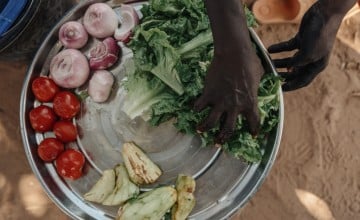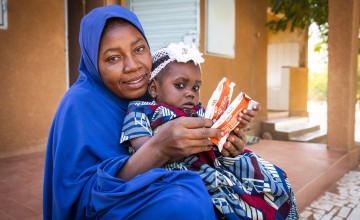
Read our 2023 annual report

Knowledge Hub
Ending global hunger will require a global effort.
As we’ve said in our breakdown of how much it will cost to end world hunger, the fight will require major changes at the political level — including changes to government policies and an end to all conflict. However, when we read the latest headlines about a new food crisis or famine, our natural response is to wonder: “What can I do to help world hunger?"
Well, there are ways you can help even at home. Here are 10 simple ideas.
1. Know how your food gets into your pantry and on your table
A food system is the process by which food is produced and prepared for people to then buy, cook, and eat. Food systems can be complex or simple — covering a small farming community in the remote highlands of Ethiopia, or encompassing the vast system that connects farms to tables across the EU. Understanding the different food systems you rely on for your daily diet is a key ingredient to helping the fight to end hunger.
2. Shop locally and seasonally
If you’ve noticed that many of the staples in your pantry are imports, or that you’re paying double the price for produce when it’s out of season, one of the best things you can do is switch to eating a more sustainable diet. Where possible, buy local products (one of the best ways of doing this is shopping at your local farmer’s markets) and focus on produce that’s in season. If you’re in Ireland, Bord Bia has a monthly calendar detailing what’s in season.
If you’re looking for ideas on how to cook what’s in season, check out our collection of recipes inspired by vegetable gardens.

3. Eat more planet-friendly foods
Buying seasonal fruits and veg is one way to eat a more planet-friendly diet. A recent commission took this one step further with the “Planetary Health Diet”, which addresses some of the biggest issues with our global food system, including climate change, deforestation, and water pollution.
Whether you follow the diet to the letter or not, the core concept is good to keep in mind if you want to help the current hunger crisis: Eat less meat and sugar, and increase your consumption of fruit, veg, nuts, and pulses. For Europeans, the commission behind the Planetary Health Diet recommends reducing red meat consumption by 77% (meaning eating less than 50 grams per day) and eating 15 times more nuts and seeds.
4. Reduce your family’s food waste
The world produces enough food to feed all of its inhabitants. Food waste is one of the biggest reasons that one in nine people go to bed hungry each night. According to the World Food Programme, one third of all food produced — over 1.1 billion tonnes of it — is never consumed. Producing this wasted food adds 3 billion tonnes of greenhouse gases to the atmosphere, perpetuating a vicious cycle.
Your own long-gone leftovers and expired veg may seem like a drop in the bucket compared to the global average, but every bit helps. If you can’t make more trips to the market to buy less each time, then make a plan for the food that you buy as you buy it. Many items can be frozen to extend their shelf life, or those bananas that you never got around to having for breakfast can be used to make a loaf of banana bread.
Much of your food can also be composted, either through your local programme or in your own home garden. This includes everything from eggshells and coffee grounds to bread and apple cores.

5. Embrace food sharing
One way you can reduce your food waste is through food sharing. This can be as simple as sharing what would otherwise go bad or unused with your neighbours or coworkers. There are also a number of food sharing programmes that work at a larger scale, including the award-winning Irish enterprise FoodCloud, which redistributes surplus food from supermarkets to charities in Ireland and the UK.
6. Learn about the causes of world hunger
When it comes to helping the cause of Zero Hunger, knowledge is power. Learn about the causes of world hunger. Some of these are obvious, but others — like gender inequality and poor public policies — may be a bit more surprising. Each cause, however, represents a challenge that must be addressed.
7. Learn about the solutions to world hunger
Once you’ve learned about the causes of hunger, there are plenty of solutions to hunger that organisations like Concern put into practice every day. You don’t need to care equally about every cause and solution — and there’s no test at the end of this article! But reading through these lists may help you find a specific cause you care about within the larger fight against hunger.

8. Learn about which countries need the most assistance
One other thing to know are the countries with the highest levels of hunger. Every year, Concern Worldwide and Welthungerhilfe co-publish the Global Hunger Index, which measures hunger levels both for that year and over time around the world. Many of the world’s hungriest countries face a combination of causes, like protracted conflict, harmful patriarchal norms, and the effects of climate change.
9. Contact your TD about the issues that matter
It will take a global effort at the political level to completely and sustainably end world hunger. Your TDs and senators look to their constituency to understand the issues that are most important to those they represent. Make your voice heard and encourage your elected officials to support Irish action against hunger. You can make your letter more actionable by focusing on a specific reason for or solution to hunger, or one country’s crisis — such as the ongoing food crisis in the Horn of Africa.

10. Support organisations like Concern
Over 90% of every donation to Concern goes directly towards our programmes in 25 countries around the world, and some of our most successful interventions against hunger are also among our most cost-effective programmes. For instance, a life-saving course of RUTF, administered as part of our Community Management of Acute Malnutrition programme, can save a malnourished child’s life for less than €50.
There are also many ways to help Concern. In addition to donating, you can:
- Fundraise on Concern’s behalf
- Enlist your company to support us through initiatives like payroll giving and corporate partnerships
- Volunteer with Concern at home or abroad
- Work with Concern
- Share stories like this on social media (we’re on Facebook, Twitter, Instagram, YouTube, LinkedIn and TikTok!)
Ending world hunger: Concern’s response
The majority of people Concern works with are involved in some way with farming and food production. Many of these communities are also on the frontlines of climate change. We work with rural communities to promote Climate Smart Agriculture, an approach that helps families adapt to better crops, growing techniques, and soil improvement practices in response to the changing — and often unpredictable — environment. We also work to strengthen links with the private sector to facilitate access to supplies and equipment.
We combine this with our award-winning and standard-setting programme, Community Management of Acute Malnutrition (CMAM), which has saved millions of lives over the past 20 years. We’ve continued to work with partners and communities to find more tailored approaches to community-based treatment of childhood malnutrition, which has led to CMAM Surge: a way of proactively responding to malnutrition during seasonal “surge” periods throughout the year. Two CMAM Surge pilot tests in Kenya in 2012 saw that the model managed peaks, without undermining other health and nutrition efforts.
Supporting Concern means that 90c from every €1 donated goes to our life-saving work in 25 countries around the world. Last year, we were able to reach over 11.4 million people with our health and nutrition initiatives.




